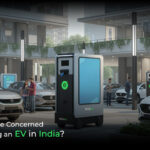India’s electric vehicle (EV) revolution is speeding up fast, but with every EV sold, one crucial question arises: what happens when those batteries reach the end of their life?
The answer lies in EV battery recycling – a vital step toward a clean energy future that balances innovation with responsibility. Without proper systems for battery waste and EV battery disposal, the environmental benefits of going electric could be lost.
The Hidden Cost of Battery Waste
Every lithium-ion battery that powers an EV contains valuable metals like lithium, cobalt, nickel, and manganese. When not recycled properly, these materials become toxic battery waste, contaminating soil and groundwater.
In India, a large portion of used batteries are handled informally, without safety measures or recovery systems. Studies suggest that less than 5% of lithium-ion batteries in India are formally recycled.
That’s a missed opportunity. Effective lithium battery recycling can reduce the need for new mining, save energy, and lower greenhouse gas emissions. It prevents toxic metals from entering the environment, ensuring safety for communities and nature.
By turning waste into value, India can transform a potential crisis into a sustainable advantage.
Recycling: The Key to India’s Circular Economy
The concept of a circular economy, where products are reused, repurposed, and recycled instead of discarded, is gaining global traction. In the EV sector, this means giving batteries a second, or even third, life.
Here’s how it works:
- Battery reuse: Before recycling, many EV batteries still retain 70–80% of their capacity. These can be repurposed for solar energy storage or backup systems.
- Recycling: When they reach full end-of-life, metals are recovered through eco-friendly processes like hydrometallurgy.
- Re-manufacturing: The recovered materials are then used to make new batteries, completing the loop.
This battery reuse and recycling cycle not only supports sustainability but also strengthens India’s manufacturing self-reliance by reducing the need for imported materials.
According to NITI Aayog, recycling and reuse could cut India’s dependence on critical minerals by billions of dollars while creating new green jobs.
The Economic Opportunity in Green Energy
Green energy isn’t just about solar panels and wind turbines , it’s also about what happens to the resources that power them. By investing in lithium battery recycling, India can recover up to 95% of valuable materials from used EV batteries.
According to UnivDatos, India’s battery recycling market was valued at USD 1.9 billion in 2023 and is expected to grow nearly 10% annually until 2032.
This emerging industry could create thousands of jobs, attract clean-tech investments, and make India a leader in sustainable mobility. It’s a win-win for both the economy and the environment.
How Mobec is Leading the Change
As India transitions toward sustainable mobility, Mobec is driving a smarter, cleaner approach to EV infrastructure. Through Mobec’s recycling initiatives, we aim to close the loop, ensuring that every lithium ion battery lives its full potential.
Here’s how Mobec contributes to the future of EV battery recycling in India:
- Second-Life Applications:
Mobec enables battery reuse by giving EV batteries a second life before final recycling, extending their value and reducing environmental impact. - Recycling Partnerships:
Through collaborations with certified recyclers and energy partners, Mobec ensures responsible EV battery recycling and recovery of valuable materials, reducing landfill waste. - Transparency and Data Insights:
Mobec’s analytics offer real-time insights on material recovery, carbon savings, and circular economy impact, ensuring transparency at every stage.
Mobec’s mission aligns perfectly with India’s vision for green energy and a truly circular economy in the EV sector.
Powering India’s Clean Energy Future
By 2030, India is projected to have over 70 GWh of used EV batteries ready for recycling. That’s not just a challenge, it’s an opportunity to reclaim materials, cut carbon, and lead the world in responsible innovation.
By combining technology, data, and vision, Mobec is helping India move from battery waste to battery wealth, from pollution to green energy, and from short-term use to long-term sustainable mobility.
Final Thought
The journey toward electric mobility doesn’t end when a battery dies, it begins again with recycling. Together, through innovation and responsibility, India can build a greener, cleaner tomorrow.




